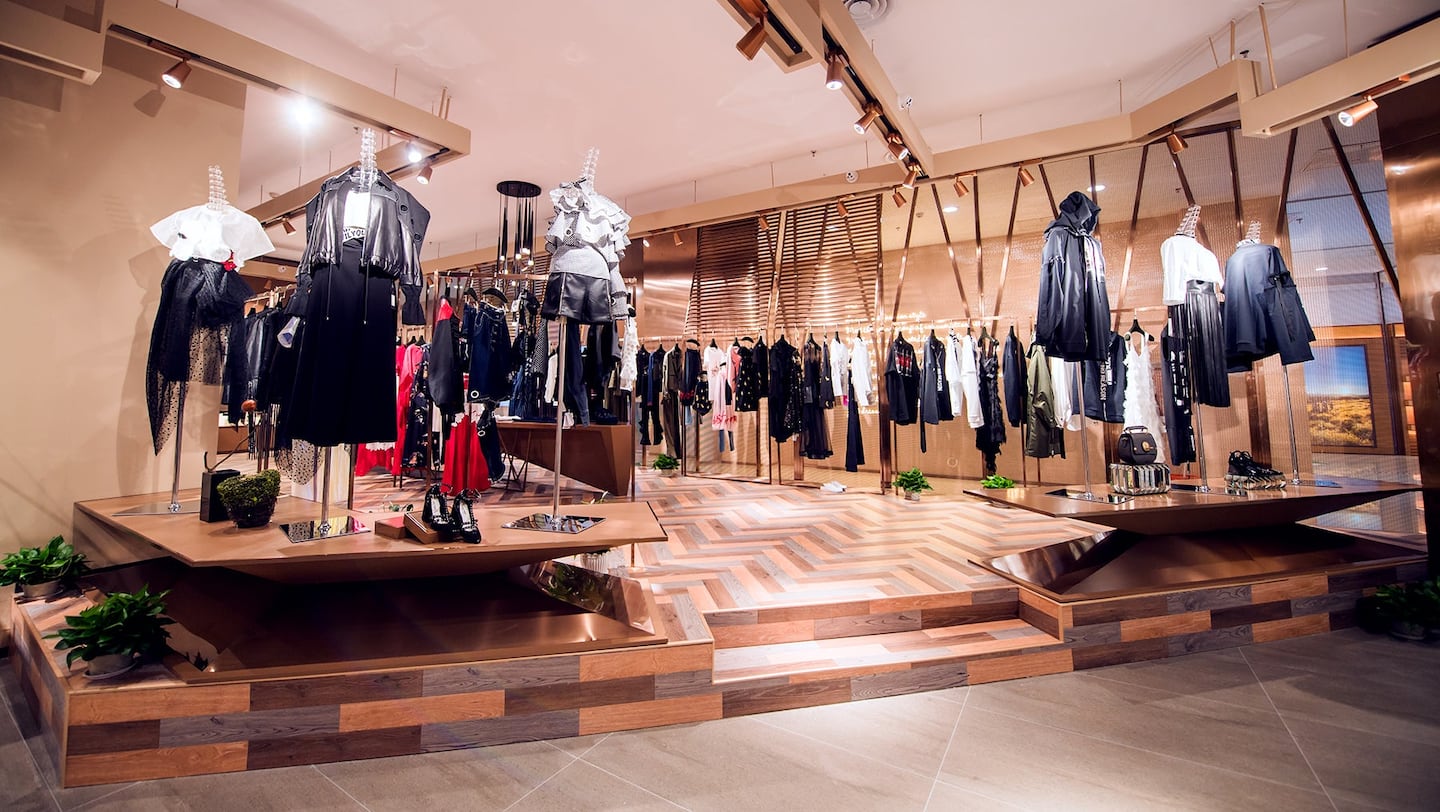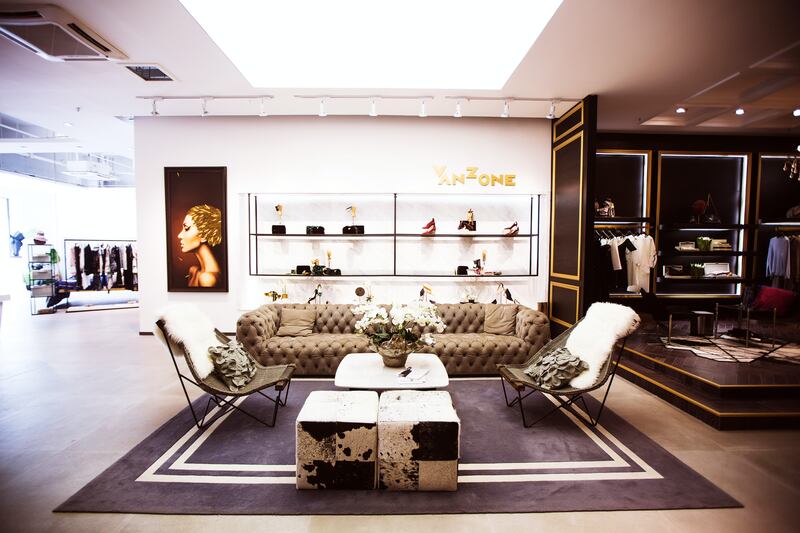
The Business of Fashion
Agenda-setting intelligence, analysis and advice for the global fashion community.

Agenda-setting intelligence, analysis and advice for the global fashion community.

CHONGQING, China — There is a new mantra for many of China's powerful young buyers and boutique owners. In this remote megacity of 30 million people, located 1,600 kilometres from Shanghai, finding the right "glocal" approach is everything, says Stephanie Wu, who alongside her two colleagues Yina Hu and Di Wu, founded their fashion boutique S.N.D. in central Chongqing five years ago. A second store in the IFC Chongqing tower — one of countless skyscrapers hugging the clouds in this metropolis — soon followed.
Chongqing’s GDP was 1.76 trillion RMB in 2016, which is around US $275 billion. To put this in the global context, it means that the economy of this one Chinese city is already bigger than that the entire economy of Qatar or Finland.
When the stakes are this high, it's no wonder that localisation has become an increasingly important competitive advantage for the likes of Wu and her colleagues to face off the buying power of much larger incumbents like Lane Crawford and I.T. But more to the point, it is about finding the sweet spot between global trends and her hometown's local market tastes. That fine balancing act is how she attracts clients to S.N.D.'s brand mix, which includes Self Portrait, Victoria Beckham, Chiara Ferragni and Opening Ceremony alongside leading Chinese designer labels like Ms Min and Immi.
The economy of this one Chinese city is already bigger than that the entire economy of Qatar or Finland.
Sometimes it comes down to the smallest of details: a bestselling dress for women in Chongqing can be a silhouette that is just centimetres longer or shorter than the trends elsewhere in the country. And the unique occasions that her customers dress for in this part of southwestern China are something that only locals can understand. Rather than focusing purely on luxury and designer clothing, many smaller boutiques are venturing into contemporary and advanced contemporary to satisfy consumers who are increasingly price savvy and value conscious.
ADVERTISEMENT
This is the case for many young multi-brand boutiques across the country. Chongqing is just one in a newly crowned group of cities that the Shanghai Media Group coined in China’s “15 New First Tier Cities”: Shenyang, Hangzhou, Wuhan, Nanjing, Tianjin, Suzhou, Xi’an, Chengdu, Changsha, Qingdao, Zhenzhou, Dalian, Dongguan, and Ningbo are the others that are considered to have joined the ranks of Shanghai, Beijing, Shenzhen and Guangzhou. There are 30 second-tier and 70 third-tier cities also on SMG’s extensive list.

Vanzone boutique | Source: Vanzone
Meanwhile, some second-tier cities that were once off the fashion retail radar are now shining brighter. Fiona Zheng, founder of Tanghui in Tangshan, Hebei province, explains: “Tangshan is a heavy industrial city with population of almost 8 million. Fashion consumption for designer labels began in recent years with the rise in standard of living. Although customers in Tangshan tend to be guided heavily by brand awareness and celebrity PR, they do develop strong brand loyalty if they find the products attractive, regardless of price point.”
In such smaller Chinese multi-brand store formats, the brands that provide ease of logistics and fast replenishment are those that are able to maintain a healthy relationship with their stockists.
“When stocking a brand in our store, we look at factors like reorder process, brand’s own marketing push, celebrity placements, ROI… these factors all affect sales performance for us of course [but] for brands from outside China, if the reorder process takes too long, it is very unrealistic for us,” says boutique founder Cheri Wen.
Wen founded her 500-square-metre store called Showroom Xiu in 2014 after returning from college in London, in Guiyang, a rising second tier city in Guizhou province. In 2016, she launched her second store, TAG (The Ark Gallery), also in Guiyang.
For S.N.D., Tanghui, and Showroom Xiu, more than 80 percent of sales come from in-store sales, with the rest via online, emphasising the importance of customer experience as well as direct, personal service. Here are some of the up-and-coming retail power brokers in China’s new first-tier megacities and second-tier cities.
Mandy Yu of Le Select
Chengdu, Sichuan province
Le Select's owner-buyer Mandy Yu earned her Master's Degree in France and launched her store in 2015, with brands including Viktor & Rolf, Giamba, Iris Van Herpen, Zuhair Murad, Nina Ricci, 3.1 Phillip Lim and The Row. Based in France, Mandy's 300-square-metre Le Select only houses non-Chinese brands.
ADVERTISEMENT
Rene Wang of Fair Minerva
Chengdu, Sichuan province
Founded in 2012, Fair Minerva is one of the early pioneers on the scene in Chengdu for designer fashion. Buyer Rene Wang has extensive experience working with European brands and showrooms. Fair Minerva stocks brands including Jil Sander Navy, Tibi, Paul & Joe, Orla Kiely, Preen Line, Joshua Saunders and Niels Peeraer.
Joanna Xu, Daniel Zu and Ice Lei of Peppermint
Ningbo, Zhejiang province
Peppermint co-founders Joanna Xu, Daniel Zu and Ice Lei all graduated from London schools in either business or design. The trio have travelled extensively and have strong connections in fashion and entertainment circles in Zhejiang. Peppermint stocks brands like Sonia Rykiel, Givenchy, Sergio Rossi, McQ, Kenzo and MSGM.
Guo Ziyi of Round Round
Nanjing, Jiangsu province
Focusing solely on local designer labels, Round Round was founded by local design guru Guo Ziyi. With four stores across Nanjing, Round Round stocks brands including Ms Min, Comme Moi by Lv Yan, Reineren and Immi, as well as Qiu Hao and Ricostru, whose collections have been featured in Vogue Italia.
Stephanie Wu, Yina Hu and Di Wu of S.N.D.
Chongqing, Chongqing municipality
S.N.D.'s Stephanie Wu, Yina Hu and Di Wu opened their first store in Chongqing in 2013 and recently launched their second store at IFC in the same city. S.N.D.'s brand portfolio includes Opening Ceremony, Ellery, N21, Philosophy di Lorenzo Serafini, Victoria Beckham, Self Portrait and Chiara Ferragni, among a selection of top Chinese designers.
Ru Zhang and Belinda Zhao of Vanzone and 11.Z
Qingdao, Shandong province
Qingdao's leading multi-label boutique chain was founded by close friends Ru Zhang and Belinda Zhao. When Vanzone first opened in 2010, the retailer housed local Chinese brands only. Alongside Ms Min, Reineren and Comme Moi by Lv Yan, 11.Z now also stocks foreign labels like Self Portrait and Chinti & Parker.
Lee Liao of Bazan
Foshan, Guangdong province
Spanning 1,000 square metres, Lee Liao founded Bazan in 2008 after her studies at L'Institut Marangoni in Paris. Her love for travelling and fashion led to the launch of Bazan, where she has created a loyal fan base for brands like Marni, MM6, Damir Doma, Erika Cavallini, Iceberg, Just Cavalli, Ports 1961 and local designer labels.
June Shan of Juneshan
Wenzhou, Zhejiang province
June Shan lived in Italy and gained experience in fashion retail before returning to China and launching Juneshan in 2013. Today, with two standalone boutiques, one focusing on bridal and the other on advanced contemporary and contemporary labels, Juneshan currently stocks Marni, Rochas, MSGM, Ports 1961, 3.1 Phillip Lim, N21, McQ over 350-square-metres of store space.
Cheri Wen of Showroom Xiu and TAG (The Ark Gallery)
Guiyang, Guizhou province
Cheri Wen graduated from school in London and founded her 500-square-metre Showroom Xiu in 2014, followed by a second store, TAG (The Ark Gallery), also in Guiyang, two years later. Both of Wen's boutiques house brands such as Joseph, MSGM, Mother of Pearl, Sonia Rykiel, Tibi, Derek Lam 10 Crosby as well as Chinese designer brands like Ms Min and Reineren.
ADVERTISEMENT
Fiona Zheng of Tanghui
Tangshan, Hebei province
Launching her first store in 2013, Tanghui's founder Fiona Zheng has over 20 years of retail experience. She currently operates two stores in Tangshan, with two opening this year that will total a footprint of over 2,000 square meters. Tanghui currently stocks brands including Sonia Rykiel, Vivetta, Coliac, Linda Farrow and Manish Arora.
Meimei Ding is the chief executive of DFO International, a market development agency with a Shanghai showroom serving international brands across China and Southeast Asia.
The views expressed in Op-Ed pieces are those of the author and do not necessarily reflect the views of The Business of Fashion.
Related Articles:
[ Op Ed | 7 Multi-brand Boutiques Transforming Chinese RetailOpens in new window ]
[ Top 10 Influential Retailers Off Fashion’s Beaten PathOpens in new window ]
[ Triple-Major, China’s Rule-Breaking RetailerOpens in new window ]
The British musician will collaborate with the Swiss brand on a collection of training apparel, and will serve as the face of their first collection to be released in August.
Designer brands including Gucci and Anya Hindmarch have been left millions of pounds out of pocket and some customers will not get refunds after the online fashion site collapsed owing more than £210m last month.
Antitrust enforcers said Tapestry’s acquisition of Capri would raise prices on handbags and accessories in the affordable luxury sector, harming consumers.
As a push to maximise sales of its popular Samba model starts to weigh on its desirability, the German sportswear giant is betting on other retro sneaker styles to tap surging demand for the 1980s ‘Terrace’ look. But fashion cycles come and go, cautions Andrea Felsted.